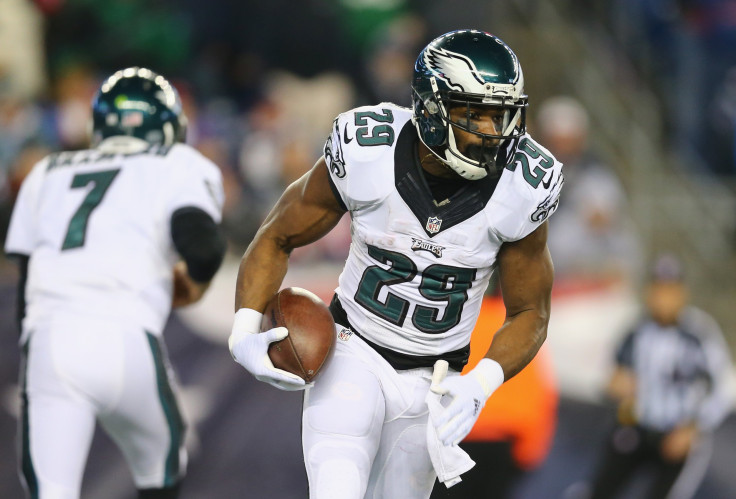Philadelphia Eagles News: DeMarco Murray's Contract The Real Issue With Chip Kelly?

Tension between Chip Kelly and DeMarco Murray has grown more public this week, with reports indicating Murray’s frustration with his role in the Philadelphia Eagles’ offense. The star running back’s issues with his coach and his lack of touches reportedly reached a point where Murray felt he had to speak to Eagles owner Jeffery Lurie about the situation.
Considering the incentives in Murray’s contract, he may have had a right to complain to Lurie. The Eagles lured 2014‘s leading rusher from the Dallas Cowboys with a five-year, $40-million contract, including $18 million in guaranteed money, according to ProFootballTalk’s report in March.
Murray’s deal also included performance incentives running from 2015 through 2018 that could amount to a total of $2 million more. During that period, should Murray gain 1,250 yards he would receive a salary escalator of $250,000 and double that if he eclipses 1,450 yards. If Murray happened to gain 1,450 yards or more in the first four seasons of the deal he would earn the full $2 million in incentives.
ESPN’s Ed Werder reported Murray spoke with Lurie following Philadelphia’s huge win over New England, and Kelly addressed the story by telling reporters Wednesday that player and owner happened to be sitting next to each other on the team plane later that night.
Kelly downplayed the meeting and Murray’s actually faced criticism for his actions and his poor play this season. Some have questioned whether the 27-year-old All-Pro should’ve even gone over coach and general manager Kelly’s head to discuss his dearth of rushing attempts and how he hasn’t fit into the Eagles offense all season. Werder would later report Murray feels Kelly hasn’t kept the promises he made when Philadelphia recruited him during free agency.
There’s little doubt Murray’s struggled to adapt to his new team, and his stats reflect the poor production. Over 11 games, starting only eight, he’s amassed 569 yards and four touchdowns off 163 rushing attempts. Murray’s also averaging only 3.5 yards per carry.
In contrast, Murray had the heaviest workload in the league last season with 392 carries amounting to 1,845 yards and 13 touchdowns, grinding out 115.3 yards per game and 4.7 yards a carry.
Murray’s still leading the Eagles in rushing, but many of the carries that would in theory have gone to him have instead been divvied out to the platoon of Ryan Mathews, Darren Sproles, and Kenjon Barner, all of whom are gaining more per rush than Murray.
Murray’s frustrations with Kelly’s offense and his lack of touches could very well have to do with his contract incentives, a fair complaint considering the short-life of an NFL running back’s career. With many teams typically moving on from their star rushers once they’ve hit the age of 30 or older, Murray really has only a few more years to earn as much as he can as a professional football player.
There’s also no guarantee, other than the $18 million in his current deal, that Murray will play out the entirety of his contract with the Eagles. Philadelphia could get his best years and let him go in 2018 at the cost of a $2 million dead cap hit. In 2019, that hit dips to $1 million. Mike Florio of Pro Football Talk even posited on Wednesday that cutting Murray was an option for the Eagles.
GMs will try to hoard salary cap space, which could be reason enough for Kelly to limit Murray’s incentives. The Eagles own the second-highest payroll in the league this season, $150.3 million and just $2 million behind the New York Jets, with roughly $9 million in cap space, according to Spotrac. NFL teams are allowed to rollover cap space and apply it to next season, giving Kelly his own incentive to limit extra expenditures. The Eagles have only $128.8 million devoted to player contracts in 2016 with $21.1 million in cap space.
Murray may have reached his breaking point with Kelly due to the short number of games left this season. In order for Murray to even reach the first incentive threshold he’ll have to gain 681 yards over Philadelphia’s final four games of the season, or rather 170.3 yards per game.
It’s an unfathomable and truly improbable task for Murray, considering Minnesota’s Adrian Peterson rushed for 651 yards in the last four games of his 2012 MVP season and he finished with 2,097 yards.
© Copyright IBTimes 2024. All rights reserved.











